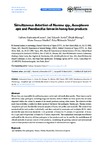Por favor, use este identificador para citar o enlazar este ítem:
http://www.alice.cnptia.embrapa.br/alice/handle/doc/1062982Registro completo de metadatos
| Campo DC | Valor | Lengua/Idioma |
|---|---|---|
| dc.contributor.author | GUIMARÃES-CESTARO, L. | pt_BR |
| dc.contributor.author | SERRÃO, J. E. | pt_BR |
| dc.contributor.author | MESSAGE, D. | pt_BR |
| dc.contributor.author | MARTINS, M. F. | pt_BR |
| dc.contributor.author | TEIXEIRA, É. W. | pt_BR |
| dc.date.accessioned | 2017-02-08T23:11:19Z | - |
| dc.date.available | 2017-02-08T23:11:19Z | - |
| dc.date.created | 2017-02-07 | pt_BR |
| dc.date.issued | 2016 | pt_BR |
| dc.identifier.citation | Journal of Hymenoptera Research, n. 49, p. 43-50, 2016. | pt_BR |
| dc.identifier.uri | http://www.alice.cnptia.embrapa.br/alice/handle/doc/1062982 | pt_BR |
| dc.description | Abstract Honey bees are responsible for pollinating many native and cultivated plant species. These insects can be affected by many pathogens, including fungi and bacteria, both of which can form spores that are easily dispersed within the colony by means of the stored products, among other routes. The objective of this study was to develop a method to detect spores of the honey bee pathogens Nosema apis, Nosema ceranae, Ascosphaera apis and Paenibacillus larvae in samples of honey, bee pollen and royal jelly. The method was standardized for each product individually, and then analyzed by monoplex and multiplex PCR, which showed the same detection thresholds: 1.25 spores/mL of honey for N. ceranae; 7.5 spores/mL of honey for A. apis; and 0.4 spore/mL of honey for P. larvae, respectively. The standardized technique was effective and rapid for the detection of these pathogens in bee products and can be used for the establishment of official methods of sanitary control of bee products, considering the growing national and international trade of these products and the movement or migration of colonies between regions. | pt_BR |
| dc.language.iso | eng | eng |
| dc.rights | openAccess | eng |
| dc.subject | Bee pathogens | pt_BR |
| dc.subject | Detection of spores | pt_BR |
| dc.title | Simultaneous detection of Nosema spp., Ascosphaera apis and Paenibacillus larvae in honey bee products. | pt_BR |
| dc.type | Artigo de periódico | pt_BR |
| dc.date.updated | 2017-02-08T23:11:19Z | pt_BR |
| dc.subject.thesagro | Apis Mellifera | pt_BR |
| dc.subject.nalthesaurus | honey | pt_BR |
| dc.subject.nalthesaurus | pollen | pt_BR |
| dc.subject.nalthesaurus | royal jelly | pt_BR |
| riaa.ainfo.id | 1062982 | pt_BR |
| riaa.ainfo.lastupdate | 2017-02-07 | pt_BR |
| dc.contributor.institution | Lubiane Guimarães-Cestaro, UFV; José Eduardo Serrão, UFV; Dejair Message, UFERSA; MARTA FONSECA MARTINS, CNPGL; Érica Weinstein Teixeira, APTA-SAA. | pt_BR |
| Aparece en las colecciones: | Artigo em periódico indexado (CNPGL)  | |
Ficheros en este ítem:
| Fichero | Descripción | Tamaño | Formato | |
|---|---|---|---|---|
| Cnpgl2016JHymenopResSimultaneous.pdf | 226,83 kB | Adobe PDF |  Visualizar/Abrir |









